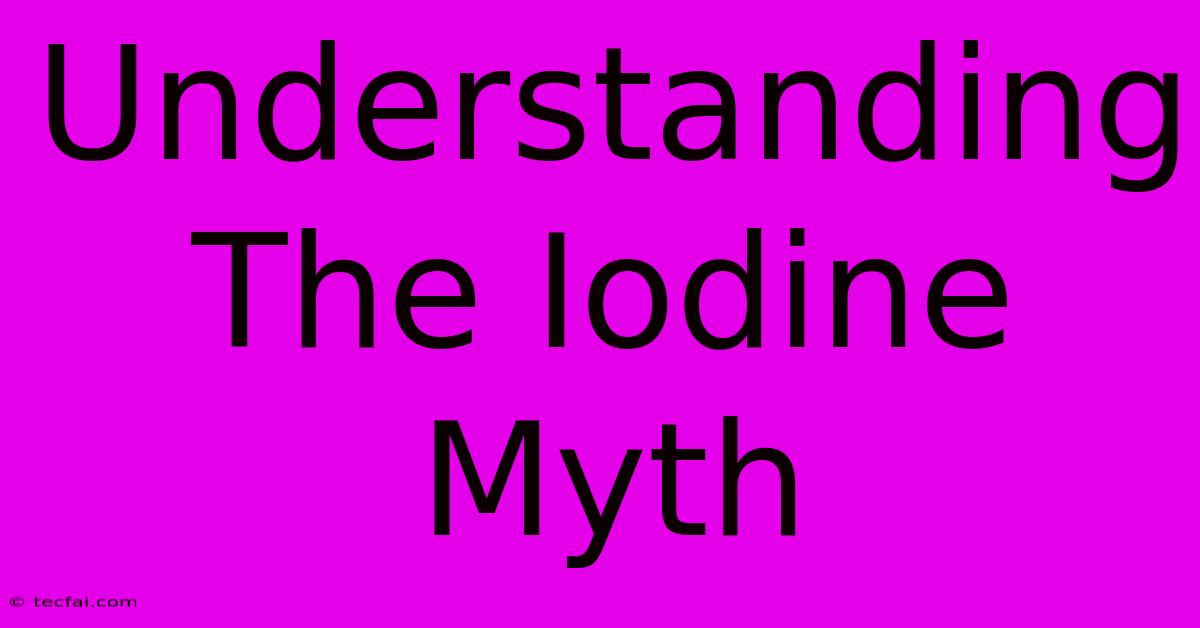Understanding The Iodine Myth

Discover more detailed and exciting information on our website. Click the link below to start your adventure: Visit Best Website tecfai.com. Don't miss out!
Table of Contents
Understanding the Iodine Myth: Separating Fact from Fiction
Iodine. The name conjures images of antiseptic solutions and fortified salt. But for many, iodine's role in health is shrouded in myth and misconception. This article aims to dissect the common iodine myths, separating fact from fiction and providing a balanced perspective on this essential mineral.
The Iodine Deficiency Myth: Not as Widespread as You Think
While iodine deficiency remains a significant global health concern, particularly in certain regions, the claim that everyone is deficient is simply untrue. Many developed nations have successfully implemented iodine supplementation programs, largely through iodized salt. This has significantly reduced the incidence of iodine deficiency disorders (IDDs) like goiter and hypothyroidism. However, certain populations remain at risk, including pregnant women, breastfeeding mothers, and those following restrictive diets. It’s crucial to assess your individual risk factors rather than assuming universal deficiency.
Identifying True Iodine Deficiency
The symptoms of iodine deficiency can be subtle and mimic other conditions. A simple blood test measuring serum TSH (thyroid-stimulating hormone) and free T4 (thyroxine) levels can accurately diagnose iodine deficiency. Self-diagnosing based solely on anecdotal evidence or online information is strongly discouraged. Always consult a healthcare professional for accurate assessment and personalized advice.
The "More is Better" Iodine Myth: A Dangerous Assumption
While iodine is vital for thyroid hormone production, consuming excessive amounts can be detrimental to health. Hyperthyroidism, characterized by an overactive thyroid, can result from iodine overload, causing symptoms like rapid heartbeat, weight loss, anxiety, and irritability. Furthermore, excessive iodine can trigger or exacerbate autoimmune thyroid conditions such as Hashimoto's thyroiditis and Graves' disease.
Finding the Right Iodine Balance
The recommended daily allowance (RDA) of iodine varies depending on age and physiological state. Pregnant and breastfeeding women require higher intakes. It's essential to obtain iodine from reliable sources such as iodized salt and a balanced diet rich in iodine-containing foods, including seaweed, seafood, and dairy products (depending on the region and farming practices). Avoid excessive iodine supplementation unless explicitly recommended by a healthcare professional.
The Iodine and Weight Loss Myth: Unfounded Claims
Some promote iodine supplementation as a weight loss aid. This claim lacks credible scientific evidence. While thyroid hormones influence metabolism, supplementing iodine without a diagnosed deficiency won't automatically lead to weight loss. Furthermore, excessive iodine can negatively impact thyroid function, potentially hindering metabolic processes rather than boosting them. Sustainable weight management strategies focus on balanced nutrition, regular exercise, and overall lifestyle changes.
Prioritizing Evidence-Based Approaches
Weight loss strategies should always be grounded in scientific evidence and guided by healthcare professionals. Relying on unproven claims regarding iodine supplementation for weight loss can be harmful and may lead to health complications.
Conclusion: A Responsible Approach to Iodine
Iodine is a crucial micronutrient, but its importance doesn't justify the myths surrounding its use. Understanding the difference between fact and fiction is paramount. Always prioritize evidence-based information, consult healthcare professionals for personalized assessments, and avoid self-treating with iodine supplements without medical guidance. A balanced diet, regular health check-ups, and a responsible approach to micronutrient intake are key to maintaining optimal health.

Thank you for visiting our website wich cover about Understanding The Iodine Myth. We hope the information provided has been useful to you. Feel free to contact us if you have any questions or need further assistance. See you next time and dont miss to bookmark.
Featured Posts
-
Rev Coles Kettering Vicar Joins I M A Celeb
Nov 22, 2024
-
Daily Trust Online Breaking News
Nov 22, 2024
-
Maura Higgins Health Check Reminder
Nov 22, 2024
-
Hayden Bids Farewell To Simpsons
Nov 22, 2024
-
Kemi Badenoch Missing Alex Burghart At Pmqs
Nov 22, 2024
